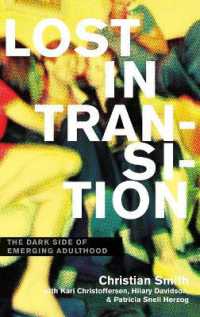- ホーム
- > 洋書
- > 英文書
- > Politics / International Relations
Full Description
Three recent Canadian prime ministers, Paul Martin, Stephen Harper, and Justin Trudeau made the same claim shortly after forming a government: "Canada is Back." Martin promised to reinvest in world affairs. Harper was focused on the military. Trudeau meant more involvement at the UN. Each leader made foreign policy a part of their political brand because they recognized that in today's world, domestic and international politics are interconnected. Canada can no longer take care of its own interests if it ignores the world around it.
This book traces the history of Canadian foreign policy from a time when positioning Canada First meant shunning international obligations to today. It highlights key decisions taken and not taken in Ottawa that have shaped Canadians' safety, security, and prosperity over the last one hundred years. Case studies focused on environmental reform, Indigenous peoples, trade, hostage diplomacy, and wartime strategy illustrate the breadth of issues that shape contemporary Canada's global realm.
Together, these cases reveal a country that has benefited from diplomatic prudence and compromise even as its citizens have yearned for their elected officials to be world leaders. This book argues that, like any country, Canada must look out for its own interests first, but in the modern world it can't do so effectively without cooperating with other states and non-state actors.
Written by two of Canada's leading foreign policy analysts, Canada First, Not Canada Alone is the definitive history of Canadian foreign policy since the 1930s.
Contents
Acknowledgments
Introduction
Chapter 1: Ideas and Antecedents
Chapter 2: William Lyon Mackenzie King and the Evolution of Canada's Global Posture, 1935-1948
Case Studies: The Voyage of the MS St Louis, 1939
The Hyde Park Declaration, 1941
The Debate over Article 2 of the North Atlantic Treaty, 1947-1949
Granting the Great Powers a Veto in the United Nations Organization, 1945
Chapter 3: Louis St. Laurent and the Expansion of the Canadian Foreign Policy Realm, 1948-1957
Case Studies: The Launch of the Colombo Plan for Cooperative Economic Development in
South and Southeast Asia, 1950-1951
The Establishment of the Distant Early Warning (DEW) Line, 1953-1957
The Suez Crisis and the Hungarian Revolution, 1956
Attending the 10th Inter-American Conference of the Organization of American States (OAS) as
an Observer, 1952-1954
Chapter 4: John Diefenbaker and the Politics of Foreign Policy Decision-making, 1957-1963
Case Studies: The Establishment of the North American Air Defence Command (NORAD), 1957-1958
South Africa's Withdrawal from the Commonwealth, 1960-1961
Negotiations to Acquire Nuclear Weapons, 1957-1963
Responding to the White House's Decision to Move American NORAD forces to
Defence Condition (DEFCON) 3 without Consulting Ottawa during the Cuban Missile Crisis,
1962
Chapter 5: Lester B. Pearson and the Domestic Implications of Canadian Foreign Policy, 1963-1968
Case Studies: The Promulgation of the Gérin-Lajoie Doctrine, 1965
Prime Minister Lester Pearson's Speech at Temple University, 1965
Managing the Impact of Split-run Magazines in Canada, 1964-1965
Chapter 6: Pierre Elliott Trudeau and the Re-imagination of "Canada First," 1968-1984
Case Studies: Reconsidering Canada's Military Role in NATO, 1968-1969
The Voyages of the SS Manhattan through the Northwest Passage, 1968-1970
Joe Clark's Proposal to Move the Canadian Embassy in Israel from Tel Aviv to Jerusalem,
1979-1980
The National Energy Program, 1980-1984
Recognizing the People's Republic of China (PRC), 1968-1970
Chapter 7: Brian Mulroney and the Transformation of Canadian International Affairs, 1984-1993
Case Studies: Responding to Famine in Ethiopia, 1984-1986
The Origins of the Canada-United States Free Trade Agreement, 1983-1989
Negotiating the Canada-United States Air Quality Agreement, 1991
Responding to Iraq's Invasion of Kuwait, 1990-1991
Chapter 8: Jean Chrétien, Frugality, and Boldness, 1993-2001
Case Studies: The Turbot War, 1994-1995
The International Campaign to Ban Anti-personnel Landmines, 1994-1997
NATO's Military Intervention in Kosovo, 1998-1999
Conflict Diamonds in Angola and UN Security Council Sanctions Reform, 1999-2000
Chapter 9: Jean Chrétien, Paul Martin, and the Aftermath of 9/11, 2000-2006
Case Studies: The Kyoto Protocol, 1997-2002
Canada's Response to the American Decision to Invade Iraq, 2002-2003
Deploying to Kandahar Province, 2003-2005
Participating in the United States Ballistic Missile Defense Program, 2003-2006
Chapter 10: Stephen Harper's Conservative Values on the World Stage, 2006-2015
Case Studies: Affirming Support for the United Nations Declaration on the Rights of Indigenous
Peoples (UNDRIP), 2007-2010
The Muskoka Initiative on Maternal, Newborn, and Child Health, 2009-2010
Canada's Response to the Euromaidan, 2013-2015
Creating the Department of Foreign Affairs, Trade, and Development, 2013
Chapter 11: Justin Trudeau and an Increasingly Dangerous World, 2015-
Case Studies: Selling Light Armoured Vehicles to Saudi Arabia, 2015-2019
Renegotiating the North American Free Trade Agreement, 2017-2018
China's Arbitrary Imprisonment of Michael Kovrig and Michael Spavor, 2018-2021
Responding to a Dramatic Increase in Irregular Migration, 2017-2020
Conclusion: Canada First in the Future
Notes
Index








